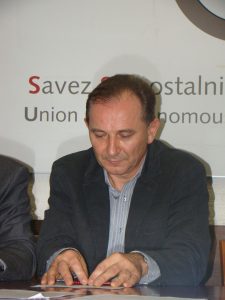We need reforms that are tailor-made to the workforce and the citizens, not only to the politicians.
At this point, we perhaps have the last opportunity to make a decision about starting to catch up to the rest of Europe, or remaining at the bottom long-term. The living and working conditions of workers seem to always be out of focus for politicians, says Mladen Novosel, president of the Association of Independent Trade Unions of Croatia (SSSH).

-
Are you satisfied with the current position of trade unions in Croatia in the social dialogue with employers and the Croatian government?
With every new government, we start a tripartite social dialogue from scratch, because they simply do not know what that is. Today, this dialogue is at the lowest point in the last few years. Goverment members and the Labour Minister (that is ever since he became Vice President of the Economic Social Council) rarely come to the Council’s sessions nowadays. If they don’t feel the urge to meet up with trade unions and employers once a month to discuss the key economic and social development issues in Croatia, then it is clear that the government does not take the social dialogue seriously. The latest example is the pension reform. We haven’t even started having serious discussions with social partners, and yet the media have been reporting that the key decisions have already been made.
The situation is a bit more complex with the HUP (the Croatian Employers’ Association). Trade unions, that are members of SSSH, have signed hundreds of collective agreements at the employer level, which means that many employers do have a social dialogue on salaries and working conditions. The other thing with the HUP and its branch organizations is that they still do not recognize the interest in collective bargaining because they don’t use collective agreements to deal with their labour-related issues. Rather, they want the government to resolve them through regulation. Nevertheless, we have two branch collective agreements in the private sector today – in construction and hospitality industry – which, following the decision made by of the Labour Minister, have been extended and bind all employers to participate in the activities stated in the agreements. SSSH is committed to the development of autonomous social dialogue with the HUP and its organizations, because we consider it to be a part of our responsibility. We share a lot of similar views with the HUP in terms of public policies, and but they have to understand that the sectoral social dialogue and collective bargaining are in their own best interest too.
2. Are you involved in consultations on the economic growth models in the country?
The Croatian problem is, first and foremost, that no one thinks about “economic growth models” in this country. For years, we have been warning that Croatia lacks a clear socio-economic development strategy, and that we have adopted the existing sectoral strategies and goals only because of the EU.
However, the government has recently formed a body in charge of drafting the Croatian Development Strategy, with SSSH also playing a role, probably thanks to its 2016 pre-election platform called “For Croatia of Satisfied Peopke” which mentions the Strategy as one of our requirements and which contains our vision of socio-economic development of Croatia. It remains to be seen how effective this body is going to be. We will certainly be an active participant.

3. What are the specific recommendations relating to improving the current position of the workforce and what are the most common problems you face?
We can stop emigration and the declining birth rate by increasing wages and improving job quality. Although salaries have finally started to grow, largely as a result of our engagement too, we are still the only new EU member state where salaries are lower than in the pre-crisis period. On the other hand, the job quality continues to decline, as evidenced by the fact that we are the absolute record holder in the EU in terms of precarious work. In practice, workers continue to face numerous violations and abuses of the Labour Act and collective agreements, from employers disrespecting their working hours and workers being unpaid for their overtime, to undocumented work and a part of salaries being disbursed in cash. Instead of constantly changing the labour legislation, as it has been done in the past 15 years, the government must finally make serious effort to enforce the laws in practice and seek new, normative and non-normative solutions to begin to improve the job quality. The implementation of extended collective agreements, that are binding to all employers and cover all workers in the said branches, must be supervised.
4. How important are trade unions in regard to Croatia’s accession to the EU and do you expect to see the concrete effects of adopting the European Pillar of Social Rights?
Trade unions, both in Europe and in Croatia, support the European project, and see it as the only way to preserve the results of the European social model in the conditions of globalization. Unfortunately, over the last ten years, the EU has neglected the importance of social dimension, focusing only on the interests of big capital and corporations. Such policies of interest, geared only towards selected groups and not citizens, are now backfiring. Populist movements are thriving because disappointed citizens support cheap promises. Therefore, the European Pillar of Social Rights may be our last chance of restoring Europe’s trust in the European project. But the full construction and implementation of the Pillar is still a long way off.
At the EU level, and in relation to European public policy, SSSH operates through membership in the European Trade Union Confederation (ETUC) and has its representatives in the European Economic and Social Committee (EGSO) which is the advisory body to all decision-making bodies at the EU level, and in the European Social Dialogue Committee (SDC), a bipartite body of employers’ and trade unions at the EU level. SSSH will also do its best at the European and national level on the implementation the European Pillar of Social Rights which is exactly what we have been doing recently by having our say in the final text of the National Reform Programme (NPR) under the European Semester (ES). Social indicators will have to be incorporated and monitored through the ES this year.

5. What are your estimates of the effects of digitalization on the job quality and quantity in Croatia?
Although Croatia chronically lacks in serious labour market analyses, including assessments of the effects of digitalization, it is clear that, in the coming years, digitalization will exert a strong influence on the job structure and quality and on the overall employment level. Rough estimates indicate that more than a half of all jobs will be technically altered due to the effects of digitalization. New social risks will emerge as a result of these changes which we should predict and find solutions for. For example, the workers that are employed via digital platforms should be able to enjoy in the adequate labour and social rights, from the right to appropriate salaries and the work-private life balance, to the right to protection of personal data and social security rights such as pension, health care, unemployment benefits etc.
6. Despite a relatively high number of unemployed, Croatia is forced to import foreign workers during tourist season. In your opinion, what is the solution for these difficult to employ people to find at work?
Structural unemployment is our long-term problem that is not being addressed in the right way. The statement that „the country has no money“ to deal with this problem simply does not work because there are significant budget (both national and EU) resources available, but the question is how they are targeted and spent. We are offended by the prejudiced statements that unemployed people are lazy and we reject the claims that all of them are unemployable.
SSSH has been persisently advocating with the government to start implementing employment policy as an integrated public policy linked to other policies (economic, educational, social). The Croatian Employment Office (HZZ) does not create new jobs, but rather implements measures on raising the employability of the lesser employable categories and helping employees with adapting to technological change in order to save their jobs. This means that public funds should not be spent on the easily employable worker categories who can find jobs without the help of these measures anyway. This is exactly what happened with the professional training for work without employment (the so-called SOR) programme which has pushed all others measures aside, and thanks to which, most of the funds went towards employing university graduates who are the most employable part of the workforce. In recent years, politicians have expressed much more interest in ostensibly reducing the youth unemployment rate, rather than developing long-term employment measures for the unemployed, where unqualified or low-skilled workers make up a significant share.
Croatia is the only EU member where salaries are still lower than they were in 2010. This has spurred emigration, and since last year, after a couple of years of economic recovery, we are finally beginning notice an increased demand for workers. Instead of using this issue of worker shortage to tackle the problem of long-term unemployment, our government decides to import foreign workers – 31,000 this year alone. That many workers were not in demand even when the country’s economic growth was at its peak!
Employers who, until recently and despite many people looking for jobs, have been forcing their staff to work in poor conditions and for low wages, are to blame for this situation to a large extent. Meanwhile, thanks to the ability to work in other EU countries, and considering that salaries in Croatia are too low to live on, workers have been leaving the country.
Now, we come to the issue of seasonal workers. Croatian tourism cannot count on domicile seasonal workers because they cannot survive the whole year working seasonal jobs in Croatia. They go to other countries because they can live the rest of the year in Croatia with the seasonal salary they have earned in Germany, for instance. Workers need more security and a decent pay, therefore SSSH wants the government to redefine what is “a permanent seasonal worker” in a way of guaranteeing the worker an adequate income and social rights (for example, the possibility of doing documented off-season work without losing the rights of permanent seasonal worker).
7. What is your message for employers and decision-makers?
I would like to recommend to employers to stop viewing workers as an easily replaced overhead, and finally start realizing that investing in people, good working conditions, and training for their workers are in their best interest too. More secure, more satisfied and highly qualified workers are more productive and contribute to the employer’s competitiveness in the global market. Recently, for the first time ever, I heard an employer saying that they view workers as an investment, and not a cost. Things have begun to change because of the lack of workers!
Politicians, on the other hand, should start thinking long-term, not just while they are in the office. A consensus on the socio-economic development needs to be achieved, and tripartite social dialogue is a suitable tool for joint work and involvement of social partners in the decision-making process.